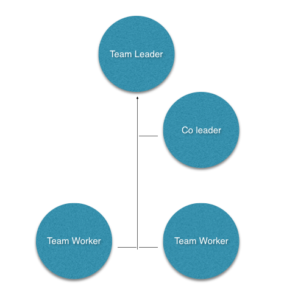Could Hierarchies Be a Practical Solution to Our MCM Project Teams?
 According to Patricl Lencioni, author of the best-selling book The Five Dysfunctions of a Team published in 2002 by Wiley, agenda is a major factor of why teams succeed or fail. Agenda, in simple terms, can be described as “a person’s motives for doing something.” When you have differing agendas within a group that is tasked to complete a project, a team can experience many problems—especially when everyone is given equal authority and rights over the project.
According to Patricl Lencioni, author of the best-selling book The Five Dysfunctions of a Team published in 2002 by Wiley, agenda is a major factor of why teams succeed or fail. Agenda, in simple terms, can be described as “a person’s motives for doing something.” When you have differing agendas within a group that is tasked to complete a project, a team can experience many problems—especially when everyone is given equal authority and rights over the project.
Since teamwork is a huge part of the MCM program, this blog post is to identify what I have observed as being the two foremost and extreme agendas held by students in the program. This is not to judge one as being right over the other, but rather to illuminate the potential problems that often exist and to potentially discuss how the team might go about dealing with these issues.
Let’s first take a look at the “Do The Least that Needs to Get Done” team member and then the “Go Above and Beyond” team member. Next, we’ll look at some possible solutions of how to all get along.
The “Do The Least That Needs to Get Done” Team Member
Some team members might understandably be busy with their jobs, families, and other classes, and feel that doing “just enough” to meet the requirements of an assignment is all they need to do to graduate, get the degree, and get that day job they’ve been dreaming of.
These students attend meetings, but they often appear to be impatient, they are present on the conference calls, but they often appear to be quiet, and they help make decisions, but they often appear to be okay with “whatever the group decides.”
Furthermore, these students often submit work to the team on time, but they seem to do it at the very last second, they submit work that provides the proper foundations, but they often appear to lack the details, and they provide feedback to other members’ submissions, but they often appear to say little more than “looks really good Joe,” and “good Jane.”
Bottom line, these team members do what some people might consider as being the least amount of work possible to get the best grade in class and they are just fine with it.
The “Go Above and Beyond” Team Member
On the other extreme hand, some team members (despite their jobs and their families) might understandably feel as though they want to go above and beyond the requirements of an assignment and feel that doing the best work in the class is what they need to do to really learn the materials and be successful in the “real world.”
They attend all meetings, but they often appear very intense and concerned, they are present on all calls, but they often appear to be extremely vocal and outspoken, and they help make group decisions, but they often appear to need to discuss all of the possibilities before feeling satisfied.
Furthermore, they turn in their work on time, but they usually appear to do so before anyone else (thereby setting the tone/look/feel for the assignments), they usually turn in work that is very polished and detailed, but by doing so they can also appear to make others’ work look minimal or inadequate, and they provide feedback to their team members’ work, but they can also appear as being nitpicky.
Bottom line, these team members set a very high bar for the group and they do what some people might consider as being “above and beyond,” and they simply thrive on it.
The Inevitable Problems and Failed Solutions
So what do you do when one person wants to do “just enough,” and another wants to “do more.” It doesn’t take a genius to see the inevitable problems that can exist when you mix students with these varying agendas. One side might perceive the other as lazy or average, and the other side might perceive the other as neurotic and overly stressed out. So, whats the solution?
Write a team Contract: Okay, so as one solution, surely one can say, “Write a preliminary team contract that specifically addresses the above behaviors and indicates exactly how everyone should carry on equally as a team.” Yes, I am totally a believer in team contracts and I agree that they do generally help to establish certain things like meeting times and modes. However, I have also witnessed that people will inevitably “carry on as they will” within just a few weeks of the contract being established as if there were never a contract written at all—and this polarity will certainly lead to friction.
Hold the Person Accountable to The Agreed Upon Terms: Okay then, so one might now say as a solution, “Hold that person accountable to the contract terms and or report that student out to the professor.” Yup, but most group members want to avoid confrontational matters because they know they might have to face that student again in another class and/or because they don’t want to bother the professor—and this leads to tension.
Ask MCM to Provide Educational Materials On Teams: Okay, so now you might say as another solution, “Ask USC MCM to provide information on proper teamsmenship and things like accountability, healthy conflict, trust, and more?” Well, guess what? They do provide plenty of materials on teams, but strangely, even as communications majors, many students do not pay attention to, or practice, these matters to the letter—even when reminded of them. I have experienced students disappearing for a week at a time, students submitting work that needed incredible amounts of editing, and students who are always canceling meetings at the last second due to work, or who are otherwise calling into meetings from what sounds like “Happy Hour” at a bar. On the other end, I have also experienced those who are “giving their all” to the MCM projects and want to push everyone to work harder—often to the annoyance of others.
So, What’s The Point? Acceptance and Authority!
Okay, so by now, you might be getting frustrated and wondering, “So what’s the solution to this team dilemma? Well, no one really knows for sure, because in fact, no two teams are exactly alike. To say that “this” or “that” will always work is impractical. Come to think of it, that’s probably why there is so much written about teamsmenship. However, I think that I may have found an unscientifically-proven solution that can save you a lot of frustration. Here goes:
Accept and Own It: Acceptance! There it is, I’ll say it again, “Acceptance.” To be sure, accept the fact that your team will more than likely be misaligned with your specific agenda. Some team members will want to do the minimum and some will want do much more than is required of them.
However, rather than compromise and/or try to impose one agenda over the other, why not just call it as it is? In other words, why not have an honest discussion prior to your next MCM class to just ask, “So which type of student team member can you be: 1) A “Do the Least That Needs to Get Done” student or 2) A “Go Above and Beyond” student?
Create a Hierarchy: By identifying the student “type,” perhaps certain authorities can be bestowed upon certain team members just as there might be certain rights granted to the captain of a ship, the first mate, and so on. These “higher ranking members”(for lack of a better phrase) would have the authority to move assignments forward, restructure and edit certain materials, and make certain decisions about subject matter without having to wait around for the less available and willing students. After all, if one student is traveling for work and can’t get to the Google Docs until the night before (or ten minutes before) an assignment is due, is it fair to impose that work schedule and ethic on the other students who are more ramped up to move an assignment forward several days or weeks before it is due so that there is time to sit on it/edit it/and let it breathe? Is it fair to jeopardize a student’s 4.0 GPA because another student is fine with a 3.8 GPA? If communication is about understanding, isn’t there two sides of the equation to consider here?
I understand that this approach might be totally contrary to some of the literature about how to run the perfect democratic team where everyone is equal, and I am also aware that this might not be what our MCM teachers want us to do. So, first and foremost, let’s all please listen to our MCM teachers without a doubt. But, as someone who is tired of reading all the fluff about creating the perfect team, I feel the burning need to share with you all an “observed truth” as a 6th semester student.
To be sure, this truth is that to my experience, some teams may not be meant to be equal at all. In this view, maybe the people who can only do the minimal amount of work should be expected to do no more than the minimal, and the people who want to do more should be granted the authority to make decisions for the group and move things forward—just like it might exist in most business settings. Why hold people to high expectations if they have no intention on meeting them? Why should others lower their own expectations to students who are caught up in their busy lives and/or unwilling to go the extra mile? Should teams be able to assign presidents, vice presidents, and team workers? Could a hierarchy system work in our MCM classes? What are your thoughts and solutions to the unbalanced team dilemma and issue of agenda? What is your team agenda? Do tell!
What Next? Can There Be Two Alpha’s in the Pack?
In my next article, I will try to tackle when you have more than one “Go Above And Beyond” student on the same team. LOL. The result is often head butting and a battle for leadership. Oh geez. Can we ever get this team thing right? Stay tuned.
Cheers and fight on!
Bobby Borg

